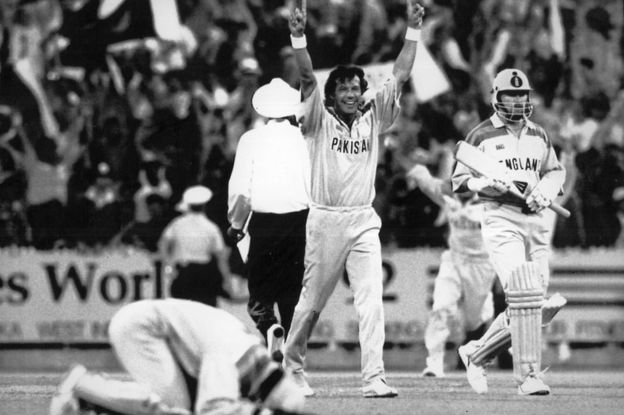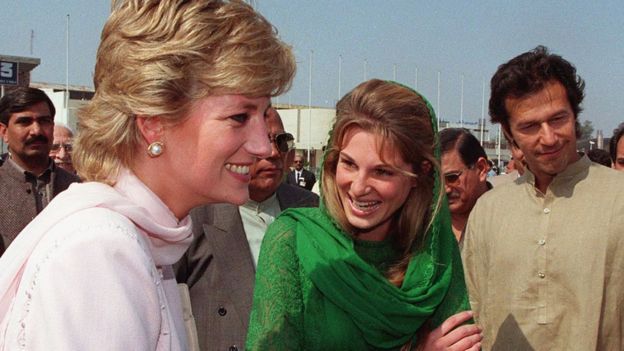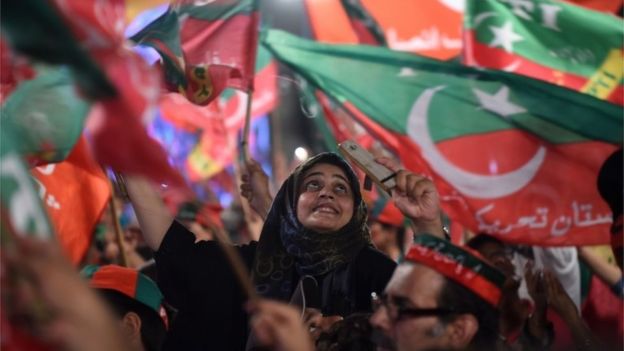
Imran Khan is a former international cricket star who has promised a "new Pakistan" and an end to corruption after claiming victory in the 2018 general election.
The charismatic captain who led Pakistan to a World Cup victory in 1992 has long shed his celebrity playboy image and now styles himself as a pious, populist, anti-poverty reformer.
Mr. Khan, 65, struggled for years to turn popular support into electoral gains. He launched his Pakistan Tehreek-e-Insaf (PTI) in 1996 but he was the only candidate in the party to win a seat in 2002. The PTI boycotted the 2008 vote.
Although he has long been one of Pakistan's best-known faces internationally, he spent years on the political sidelines. That led to teasing - for some Imran Khan became "Imran Khan's".
It took until the last general election in 2013 for his party to emerge as a serious player when it narrowly missed becoming the second-largest party nationally.
But five years on, he has won an election in Pakistan, a nuclear-armed Islamic republic and a potential flashpoint because of its rocky relations with India and Afghanistan.

During the campaign, Mr. Khan faced accusations - which he denied - that he was the military's favored candidate and that its intelligence service was working behind the scenes against his key rivals.
He needed an electoral swing of epic proportions to finally bring his political dreams to fruition.
The PTI held just under one-tenth of the 342 seats in the National Assembly. It had to make huge gains in the crucial province of Punjab, which has more than half of the 272 directly-elected seats and is the power base of ousted former Prime Minister Nawaz Sharif and his Pakistan Muslim League-Nawaz (PML-N) party.
In the end, Mr. Khan's PTI party dominated the election, winning 116 of the 272 seats up for grabs and trouncing the PML-N. The PTI has partnered with several smaller parties to form a majority in parliament.
Many say his subsequent forays into the fields of philanthropy and politics were fuelled by a desire to put to use the leadership qualities and goodwill he acquired as a cricketer.
His pin-up looks and private life have ensured he's been a favorite of the world's media for decades.
 GETTY IMAGES
GETTY IMAGES
In 1995, at the age of 43, he married the 21-year-old British heiress, Jemima Goldsmith - the daughter of one of the world's richest men at the time, Sir James Goldsmith.
The marriage produced two boys but was dissolved in 2004. The split was amicable, and Mr. Khan appears to have maintained a friendly relationship with his ex-wife.
A second marriage in 2015, to journalist Reham Khan, lasted less than a year. The former BBC weather presenter alleges she was bullied by his supporters and has written a tell-all memoir.
It has been making waves in Pakistan, where its publication was put on hold by the courts in the run-up to the election.
Mr. Khan wed again in 2018 in a low-profile ceremony in Lahore.
His third wife Bushra Watto, a mother of five, was described as his spiritual adviser, and observers say the match plays well with his public shows of devotion to Islam.
- Why Pak matters
As a politician, Imran Khan's views have often shifted or been vague. Many accuse him of U-turns. What he will actually do in power is largely unclear.

He upholds liberalism but at the same time appeals to Islamic values and anti-West sentiment, especially when it comes to perceived interference in Pakistan's internal affairs. He campaigned vocally against US drone strikes against militants in Pakistan's tribal areas as part of the "war on terror".
He has criticized some of the Taliban's violence but last year his party's government in Khyber Pakhtunkhwa province gave $3m (£2.3m) to the notorious Haqqania madrassa. Its head, Maulana Sami-ul Haq, is known as the "father of the Taliban". Imran Khan has had to fight off taunts he should be called "Taliban Khan".
But it's his campaign against corruption and dynastic politics in Pakistan, and a promise to raise a whole new class of "clean" politicians, that seems to have chimed with his supporters.
He has sought to ride a wave of disillusionment at Pakistan's old political order, particularly among the urban middle class and young voters, who are tired of living in a country with an economy and currency on the slide, and water and power supplies in constant crisis.
The main target of his anti-corruption campaign has been his arch-rival, Nawaz Sharif.
The Panama Papers leak in 2015 revealed several of Mr. Sharif's children had links to offshore companies that were allegedly used to channel funds and buy foreign assets.
That moment provided Imran Khan with his big chance - and he seized it.
His campaign against the Sharifs saw him threaten to blockade the capital with his supporters. Nawaz Sharif was ousted from the office of prime minister in 2017 and is now behind bars, sentenced to 10 years in prison by an anti-corruption court. The Sharifs maintain the charges are politically motivated.
at last Imran khan win against corrupt politicians and win the election
Now the Pakistani nation is hopeful for a better future of Pakistan,
Pakistan Zindabad
Comments
Post a Comment